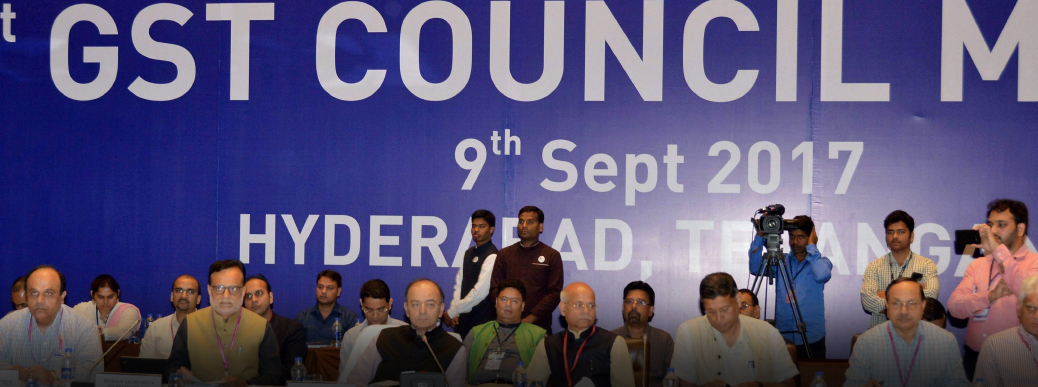GST Council
21, Jul 2018

Prelims level :
Mains level : Paper - III Indian economy
Conceding to a long standing demand, the GST council has exempted several goods from the GST net.
Background:
- Goods & Services Tax Council is a constitutional body for making recommendations to the Union and State Government on issues related to Goods and Service Tax.
- Article 279A says that President shall by order constitute a Council to be called the Goods and Services Tax Council.
- The Union Finance Minister – Chairperson;
- The Union Minister of State in charge of Revenue or Finance – Member;
- The minister in charge of finance or taxation or any other minister nominated by each state government – members.
- One-half of the total number of members of GSTC form quorum in meetings of GSTC. Decision in GSTC are taken by a majority of not less than three-fourth of weighted votes cast. Centre has one-third weightage of the total votes cast and all the states taken together have two-third of weightage of the total votes cast.
- The Goods and Services Tax Council shall make recommendations to the Union and the States on.
- The taxes, cesses and surcharges levied by the Union, the States and the local bodies which may be subsumed in the goods and services tax.
- The goods and services that may be subjected to, or exempted from the goods and services tax.
- Model Goods and Services Tax Laws, principles of levy, apportionment of Goods and Services Tax levied on supplies in the course of inter-State trade or commerce under article 269A and the principles that govern the place of supply.
- The threshold limit of turnover below which goods and services may be exempted from goods and services tax.
- The rates including floor rates with bands of goods and services tax.
- Any special rate or rates for a specified period, to raise additional resources during any natural calamity or disaster.
- Special provision with respect to the States of Arunachal Pradesh, Assam, Jammu and Kashmir, Manipur, Meghalaya, Mizoram, Nagaland, Sikkim, Tripura, Himachal Pradesh and Uttarakhand; and any other matter relating to the goods and services tax, as the Council may decide.
- The Goods and Services Tax Council shall recommend the date on which the goods and services tax be levied on petroleum crude, high speed diesel, motor spirit (commonly known as petrol), natural gas and aviation turbine fuel.
- The Council, made up of state finance ministers and with the Union finance minister as the chairperson, has served up a superb template for cooperative federalism. there will be disagreements, sometimes very fundamental, yet convergence for the cause of the larger global good is very much possible.
- Both the Centre and the States agreed to share their powers to achieve uniformity and remove compartmentalisation in indirect taxation.
- GST Implementation Committee (GIC), Standing Committees and Sectoral Groups have representation of Centre and State Officers in to ensure quick administrative decisions.
- Realising the future potential of India will require states to be key (if not equal) stakeholders in policy decisions, the traditional top-down approach with the Union government at the helm will no longer work.
- Given the deep political divide—given fundamentally differing political ideologies—between the Union government and some of the state governments, convergence of views is tough.
- And the way the council is structured, things can’t go forward without a consensus or at least a majority of the votes carrying the resolution. This is because the states together account for two-thirds of the votes and the centre holds only a third; given this structure, a consensus would be the preferred option instead of demanding a vote.
- The council’s decisions, if detrimental, cannot be undone by the states and the states will accordingly have to compromise on their budgets and the entire fiscal policies.
- It is not possible to attain the desired majority if Union doesn’t vote for the recommendation. In fact, Union can veto the recommendations of the Council.
- Therefore, it will not be out of place to say that council might act as an instrument for the backdoor entry of the central government into the decision and policy making sphere of a duly elected state government.
- The above implies that the Council has the power to make binding recommendations, and Union has attained veto over the law making power of the States. This is in clear violation of concept of federal structure of the Constitution of India. This is a clear abrogation of the fundamental tenet of the Constitution’s federal structure viz. the political sovereignty of states.
- It is then clear that the GST Council has shown the light on cooperative federalism. This intangible gain is as important as the fact that India is on the threshold of rolling out a monumental piece of reform.
Composition of GST Council:
GST Council which will be a joint forum of the Centre and the States, shall consist of the following members: –
Vision:
To establish highest standards of co-operative federalism in the functioning of GST Council, which is the first constitutional federal body vested with powers to take all major decision relating to GST.
Mission:
Evolving by a process of wider consultation, a Goods and Services Tax structure, which is information technology driven and user friendly.






